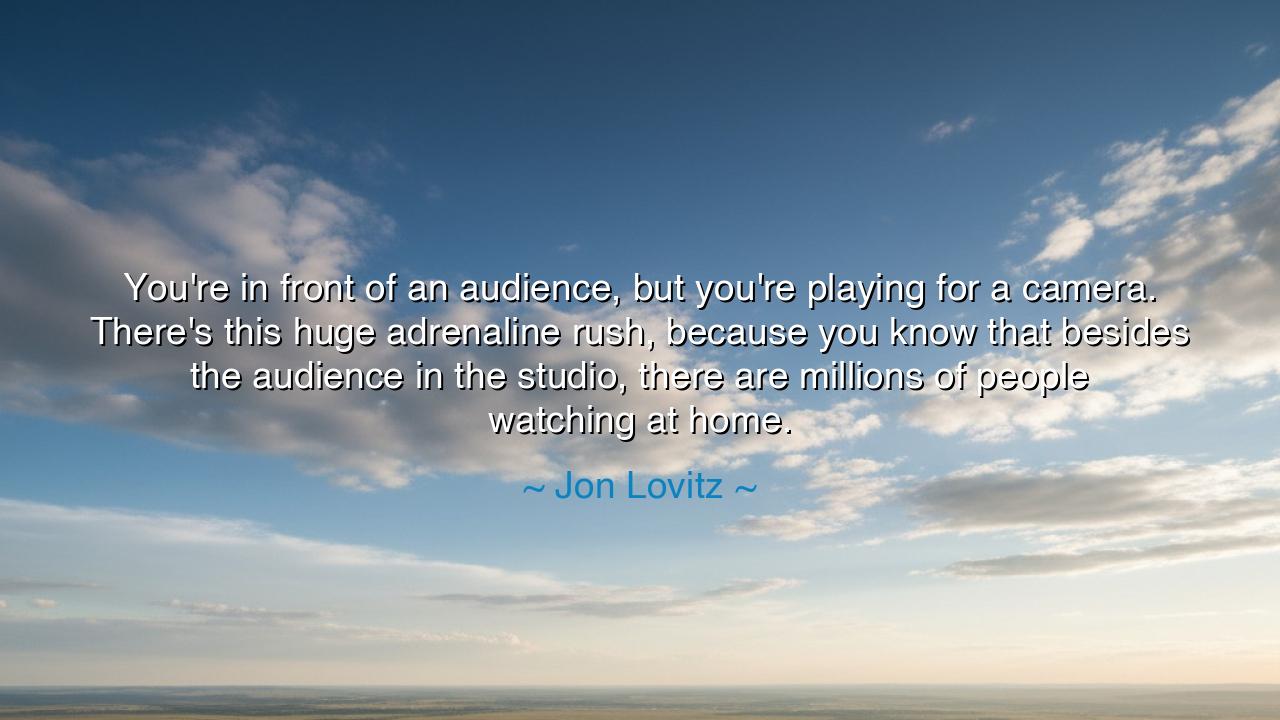
You're in front of an audience, but you're playing for a camera.
You're in front of an audience, but you're playing for a camera. There's this huge adrenaline rush, because you know that besides the audience in the studio, there are millions of people watching at home.






In the vibrant and insightful words of Jon Lovitz, a performer whose craft bridges the stage and the screen, we find a revelation about art, presence, and the power of connection: “You’re in front of an audience, but you’re playing for a camera. There’s this huge adrenaline rush, because you know that besides the audience in the studio, there are millions of people watching at home.” What seems at first a description of performance is, in truth, a reflection on the balance between immediacy and eternity, between the moment that lives and the memory that endures. Lovitz’s words reveal the double burden of the modern artist — to stand before the few, while knowing that the many unseen will also bear witness.
The ancients knew this feeling in another form. When Homer sang his epics before the gathered fires of Greece, he spoke to those around him, but his words were meant for generations yet unborn. The performer stands always between two worlds — the present, filled with breath and laughter and applause, and the future, where his image or his words will live beyond him. Lovitz’s adrenaline rush is the heartbeat of that ancient truth: the knowledge that what is done in one moment may echo in countless unseen hearts. To act before the camera, while feeling the audience alive before you, is to live in both the temporal and the eternal — the mortal instant and the immortal recording.
The camera is a strange and powerful witness. Unlike the audience, it gives no reaction, no laughter, no sigh — and yet it captures every breath, every tremor of the soul. To perform before it, as Lovitz describes, requires a sacred awareness: that though the artist stands in a small room, their spirit reaches into homes across the world. This is the paradox of performance — to be intimate and universal at once, to offer truth not just to the eyes that see you, but to the millions who will one day feel you. The adrenaline, then, is not mere excitement — it is the pulse of purpose, the awareness of one’s responsibility to both the seen and the unseen.
Consider the story of the Roman orator Cicero, who stood before the Senate and the people to speak words that would define a republic. In his voice resided both presence and projection. He spoke to the living crowd, but his true audience was eternity — the generations that would remember his courage and eloquence long after the applause had faded. Just as Jon Lovitz balances between the laughter of the studio and the silence of millions watching at home, Cicero balanced between the immediate power of persuasion and the enduring echo of his words in history. Both teach us that mastery in any craft demands awareness of the two realms: the moment and the legacy.
The origin of Lovitz’s quote lies in his experience on shows like Saturday Night Live, where the performer must embody both theater and broadcast — the primal energy of live reaction and the eternal scrutiny of the lens. Each joke, each gesture, must live twice: once in the fleeting joy of the audience’s laughter, and again in the endless replay of the screen. This duality mirrors life itself: each choice we make resonates both in the immediate circle of those we touch and in the unseen ripple that extends far beyond. To live consciously, then, is to live as Lovitz performs — aware that every act, however small, might be witnessed by countless souls we may never meet.
There is in his words also a lesson about authenticity under pressure. The performer’s adrenaline is not fear but focus — the sharpening of the spirit that comes when one realizes the weight of the moment. The same applies to every calling, whether of artist, teacher, leader, or parent. When others look to us — whether they number five or five million — we must act with integrity, with full presence, with heart. For just as the camera captures the truth of the performer, life itself records the truth of our deeds.
Let this be the lesson: do everything as though the world is watching, for in some way, it always is. The stage may change, the audience may vary, but the essence is the same — every act we perform carries our spirit into the hearts of others. The adrenaline that comes from this awareness is not a burden but a blessing, a sign that we are alive, that what we do matters.
Action to take: when you stand before others — whether to speak, to lead, or to love — remember Jon Lovitz’s wisdom. Feel the pulse of the moment, but do not be bound by it. Offer your truth fully, as if every breath is both performance and legacy. For the wise know that to live well is to perform beautifully — not for applause, but for connection; not for fame, but for meaning. And when you can hold both — the audience before you and the millions unseen beyond — then your life, like great art, becomes eternal.






AAdministratorAdministrator
Welcome, honored guests. Please leave a comment, we will respond soon